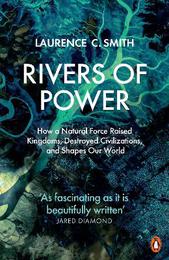
|
Rivers of Power: How a Natural Force Raised Kingdoms, Destroyed Civilizations, and Shapes Our World
Paperback / softback
Main Details
| Title |
Rivers of Power: How a Natural Force Raised Kingdoms, Destroyed Civilizations, and Shapes Our World
|
| Authors and Contributors |
By (author) Laurence C. Smith
|
| Physical Properties |
| Format:Paperback / softback | | Pages:368 | | Dimensions(mm): Height 198,Width 129 |
|
| Category/Genre | World history
Historical geography
Pets and the Natural World |
|---|
| ISBN/Barcode |
9780141987231
|
| Classifications | Dewey:551.483 |
|---|
| Audience | | General | | Tertiary Education (US: College) | | Professional & Vocational | |
|---|
|
Publishing Details |
| Publisher |
Penguin Books Ltd
|
| Imprint |
Penguin Books Ltd
|
| Publication Date |
29 April 2021 |
| Publication Country |
United Kingdom
|
Description
A sweeping natural history of how rivers have shaped the course of civilization Rivers have opened frontiers, defined borders, supported trade, generated energy and fed billions. Most of our greatest cities stand on river banks or deltas, and our quest for mastery has spurred staggering advances in engineering, science and law. Rivers and their topographic divides have shaped the territories of nations and the migration of peoples, and yet - as their resources become ever more precious - can foster cooperation even among enemy states. And though they become increasingly domesticated, they remain a formidable global force- these vast arterial powers promote life but are capable of destroying everything in their path. From ancient Egypt to our growing contemporary metropolises, Rivers of Power reveals why rivers matter so profoundly to human civilization, and how they continue to be indispensable to our societies and wellbeing.
Author Biography
Laurence C. Smith is the John Atwater and Diana Nelson University Professor of Environmental Studies and Professor of Earth, Environmental and Planetary Sciences at Brown University. Previously, he was Professor and Chair of Geography at UCLA. His research interests include the Arctic, water resources and satellite remote sensing technologies. He has published extensively in journals including Science and Nature, as well as in the Financial Times, New York Times, Wall Street Journal, Economist, Washington Post, Discover and on the BBC. In 2012 his book The World in 2050 won the Walter P. Kistler Book Award and was a Nature Editor's Pick. He has worked on issues from climate change to Arctic development with the National Science Foundation, NASA, the United Nations and the World Economic Forum, where he was an invited speaker.
ReviewsSmith takes readers on a tour of the world's great rivers. The result is fascinating, eye-opening, sometimes alarming, and ultimately inspiring. -- Elizabeth Kolbert, Pulitzer Prize-winning author of The Sixth Extinction A tour de force - a narrative as powerful as the rivers he documents. He is up there with Jared Diamond - a storyteller with real craft. From Herodotus musing on the Nile to the dam makers of modern China, this is their story. -- Fred Pearce, author of When The Rivers Run Dry This book about rivers is as fascinating as it is beautifully written -- Jared Diamond, Pulitzer Prize-winning author of Guns, Germs and Steel, and Upheaval Passionate... and infectiously enthusiastic ... an eclectic journey through several millennia. -- Victor Mallet * The Financial Times * Instructive and entertaining. Smith's prose is clear and he explains scientific concepts well. * The Times * A hymn to hydrology ancient and modern. * The Spectator * With scholarship, literary flair, and a personal touch, Smith takes the reader on a fascinating and surprising voyage of discovery. He also sounds a clarion call for all of us to invest in protecting our rivers as a means of improving our own lives. -- Eric Jay Dolin, bestselling author of Black Flags, Blue Waters How can one write a world history of rivers? Laurence C. Smith triumphantly meets the challenge, fluently comparing the role of rivers in wartime, in trade, in water management, in floods and droughts, and, looking to the future, in a world of rising temperatures. -- David Abulafia, author of The Boundless Sea Engaging, informative, magisterial in its coverage, intimidating in the scope of its command of the material, there's no end to the good things to be said about this book. * Geography Realm * Absorbing. Smith is not only an excellent storyteller, he is also perhaps the world's leading scientist using satellites to unlock the secrets of the planet's rivers. His deep understanding will inspire readers to see rivers in wholly new and surprising ways. -- Paul Bates, Professor of Hydrology, University of Bristol Smith demonstrates compellingly and engagingly that rivers have played a key role in the development of nations and, indeed, of humankind itself. -- Professor Julian Dowdeswell, Director of the Scott Centre for Polar Research, University of Cambridge
|